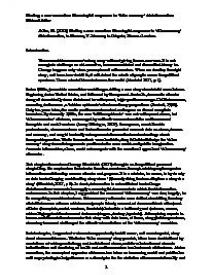Finding a new narrative : Meaningful responses to ‘false memory’ disinformation
This chapter draws from George Monbiot’s (2017) thoughts on the political power of storytelling. He emphasizes that stories function as schema through which people organize information and develop a sense of order and purpose. It is a mistake, he warns, to try to rely on data to challenging a misleading story since ‘[t]he only thing that can displace a story is a story’ (Monbiot, 2017, p 3). In short, information is not sufficient to challenge disinformation: we must also supply a meaningful framework in which that information makes sense. In this chapter, I suggest that the success of ‘false memory’ was due, largely, to its compelling narrative features. False memory advocates were skilled at retelling the story of child abuse as a drama with heroes (people falsely accused of abuse and their allies) and villains (therapists, social workers, feminists) locked in a battle of good (science, reason, rationality) against the forces of darkness (dogma, fantasy, hysteria). Attempts by experts in trauma and dissociation to counter this story with data have, at times, struggled for purchase, since they have not challenged the affective foundations of the ‘false memory’ narrative.
In this chapter, I argue that we have the opportunity to tell a new, and more hopeful, story about abuse and trauma. While the ‘false memory’ story persists, it has been destabilized by revelations of widespread clergy and institutional abuse, and its valorization of staunch individualism and devaluing of health and welfare services has lost much of its sheen. At the same time, the conceptual apparatus of trauma has taken on increasing social and political as well as psychological significance as a descriptor for the violation of human relationality and the restorative power of care and support. Increased public interest and understanding of trauma provides much of the material for counter-narratives that oppose the alienating individualism and cynicism promoted by ‘false memory’ advocates. As public and professional interest in trauma grows, ‘storifying’ trauma in principled and solutions-focused ways offers a genuine alternative to the outmoded narratives of the past.
Geachte bezoeker,
De informatie die u nu opvraagt, kan door psychotraumanet niet aan u worden getoond. Dit kan verschillende redenen hebben,
waarvan (bescherming van het) auteursrecht de meeste voorkomende is. Wanneer het mogelijk is om u door te verwijzen naar de bron
van deze informatie, dan ziet u hier onder een link naar die plek.
Als er geen link staat, kunt u contact opnemen met de bibliotheek,
die u verder op weg kan helpen.
Met vriendelijke groet,
Het psychotraumanet-team.
In: V. Sinason (ed.), (2018). Memory in Dispute, London : Karnac | 10 pages
https://www.academia.edu/36014606/Finding_a_new_narrative_Meaningful_responses_to_false_memory_disinformation


